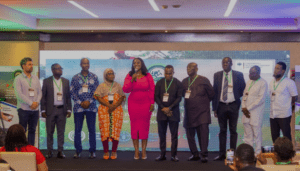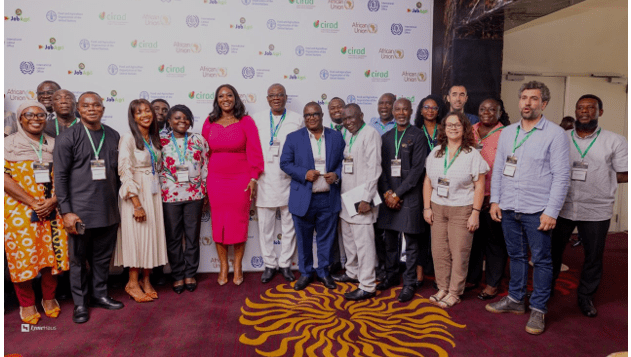By Juliet ETEFE
The European Union (EU) and the International Labour Organisation (ILO), in collaboration with government, have officially launched the EU-Ghana Pact for Skills: Integrated Action on Green Jobs and Skills project.
This initiative, spanning 2024 to 2027, aims at enhancing youth employment in Ghana through skill development aligned with green, digital and pharmaceutical sectors.

As a flagship initiative under the broader EU-Ghana Skills Pact Programme, the project aims to bridge the skills gap and demands of the private sector while fostering policies that support green job creation and sustainable economic growth.
With a total budget of €3.7million, the initiative aligns with the country’s National Green Jobs Strategy (2021-2025), contributing to several Sustainable Development Goals (SDGs), including quality education (SDG 4), gender equality (SDG 5), decent work (SDG 8) and climate action (SDG 13).
Country Director for Nigeria, Ghana and Liberia at the ILO, Dr. Vanessa Phala, in her remark, underscores the importance of empowering the country’s workforce for a sustainable and inclusive future.
She emphasised the urgency of addressing climate change by adopting cleaner technologies and the critical role of a skilled workforce in implementing these solutions.
Acknowledging Ghana’s economic growth over the past two decades, Dr. Phala highlights persistent challenges such as youth unemployment and job insecurity for women, which demand immediate attention and sustainable employment opportunities in emerging green and digital sectors.
She, however, commends Ghana’s leadership in prioritising climate resilience and sustainable energy through its Nationally Determined Contributions (NDCs) under the Paris Agreement.
Dr. Phala stressed the importance of policy coherence in aligning skills development with environmental sustainability, institutional capacity-building and expanding competency-based training programmes.
She, therefore, urged all stakeholders to work together to ensure the project’s success, leaving a legacy that supports climate resilience, decent work, and social equity for future generations.
Skills development
Programme Officer for the EU Delegation in Ghana, Anders Guettou Djurfeldt, also underscored the need for a robust TVET system to prepare Ghana’s youth for the evolving labour market.
Mr. Djurfeldt highlighted the success of free TVET education, which has led to more enrolments among Ghanaian youth, adding that the EU-Ghana Pact for Skills aims to leverage this momentum by enhancing employment opportunities in future-oriented sectors and supporting Ghana’s transition to a smart, green and digitally-driven economy.
He expressed confidence that the programme would significantly contribute to the country’s sustainable development; and pledged continued collaboration to ensure its success.
Harnessing green economy for sustainable future
The Chief Director of the Ministry of Employment and Labour Relations, Kizito Ballan, in a keynote address on behalf of the sector minister, lauded the collaboration between Ghana, the International Labour Organisation (ILO), and the European Union (EU), which underscores a shared vision of sustainable economic growth.
He described the initiative as a significant milestone in the country’s journey to address climate change by developing green jobs.
He noted that subsequent efforts, such as the Nationally Determined Contributions (NDCs), aimed to mitigate climate change’s effects on the environment and livelihoods.
However, he acknowledged that the transition to a green economy has occasionally posed challenges for the labour market, noting the ministry’s proactive approach since 2017 to ensure a just transition, maximising positive impacts while addressing the adverse effects of climate action.
He further underscored the importance of harmonising green job initiatives, strengthening technical and vocational education systems, and fostering sustainable development.
Calling for collaboration among stakeholders, he emphasised that harnessing the green economy’s potential is key to creating decent jobs and a sustainable future for Ghana.
The project aims to strengthen institutional capacity, address skill mismatches and promote green jobs aligned with Ghana’s Green Jobs Strategy and educational reforms. Through targeted activities such as national dialogues, public-private partnerships and capacity building for trainers, the project seeks to create scalable, demand-driven solutions.
The project’s steering committee has been constituted to oversee its implementation, with other necessary processes already underway.










